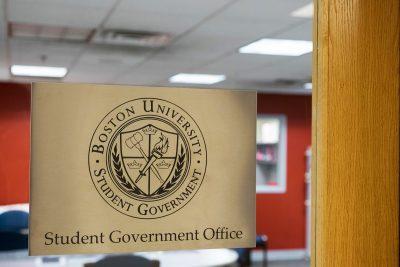
Boston University Student Government endorsed demands made by the Service Employees International Union Local 509, amended resolutions defining the structure of StuGov and introduced the majority party’s collaboration with the Queer Activist Collective.
SEIU Local 509 represents “all non-tenured or non-tenure-track lecturers, senior lecturers, master lecturers, and instructors who are salaried,” as described on BU’s Human Resources website. The union is currently in negotiations with the University for a new contract that would increase job security, access to technology and “equitable” pay for lecturers.
The endorsement resolution was introduced by Senator Alex Brumfield, a sophomore in the College of Arts and Sciences and the Frederick S. Pardee School of Global Studies, and Senator Miky Rahmani, a sophomore in the Questrom School of Business.
Brumfield noted how the issue of access to adequate technology for teaching fellows has impacted students’ learning experience.
“Some lecturers are actually documented to have to borrow their students’ laptops to be able to do their presentations in class,” Brumfield said. “It’s not very hard to see how this becomes a student issue as well.”
CAS sophomore and senator Dhruv Kapadia asked how StuGov could feasibly support the union in passing the resolution, noting a similar resolution that was passed last year with little follow-up action.
“Typically what happens is we pass it in the Senate and it doesn’t lead to any concrete action,” he said. “What is the most concrete step that’s going to be taken after we, I’m guessing, likely pass this resolution?”
Brumfield said the goal would be to release an open letter — possibly with the help of members of BU’s chapter of Young Democratic Socialists of America — addressed to BU’s administration and stay in contact with SEIU Local 509 to hear how students can support the union.
The resolution passed with 38 votes.
The meeting continued with two resolutions to further define StuGov’s laws.
The first, Resolution 004, redefined the constituency of senators, clarified potential conflicts of interest between branches and addressed the filling of Senate seats.
The resolution changed the language from “College Governments shall elect senators for every 500 students” to “College governments shall grant access to their respective college’s entire student body the ability to elect senators,” and that “all allocated Senate seats must be filled by the fall semester prior to the first Senate meeting.”
The resolution passed with 39 votes in the affirmative.
The second, Resolution 005, clarified the structure of the legislative branch in StuGov’s Constitution, presented by Senate Chair Shashwat Shah, a senior in CAS.
“The Constitution is for defining the structure and the roles and how they work for Student Government,” he said. “If you don’t have a super great definition of the structure, it could create problems in the future.”
Shah added that the Senate will “largely look the same,” but would determine the number of senators per college within BU using census trends for the total student population over the past 5 years, giving each college at least two seats instead of just one.
These changes would take effect in the 2022-2023 academic year.
The resolution passed with 39 votes in the affirmative.
Majority Party and BU’s Queer Activist Collective, or Q, representatives next presented on potential improvements BU could make to provide better accommodations and resources for its LGBTQ+ students.
Majority Party leader and Senator Ricky Nieto, a CAS junior, shared how working with Q would fall in line with the party’s tenets of inclusivity, affordability and sustainability.
“Part of Q is creating an inclusive environment for LGBTQ students on campus,” Nieto said. “But affordability is also tied in. They’re advocating for funding for gender-affirming products for students on campus who, right now, have to bear the costs of that themselves.”
Nieto said sustainability is meant not in an environmental sense here, but in the need for concrete, reliable changes — adding that it is important to create “long-lasting and sustainable change” for LGBTQ+ students, citing a lack of University-provided resources at present.
Presenters said they recommended the creation of a fully staffed LGBTQIA+ center and the expansion of access to gender-affirming healthcare coverage, as well advocating for the city’s renaming of Silber Way — named for the homophobic former University president John Silber.
Senator Michael Arellano, a junior in CAS, said that a system like the Condom Fairy, a Student Health Services initiative that discretely delivers free safe sex supplies to students, could be applied to providing gender-affirming products.
“We want to ensure that students that would like to explore their identity … are able to do so in the most comfortable, private manner,” Arellano said. “Sometimes students might not have the ability to do it at home, or sometimes they might not have the financial resources.”























































































































